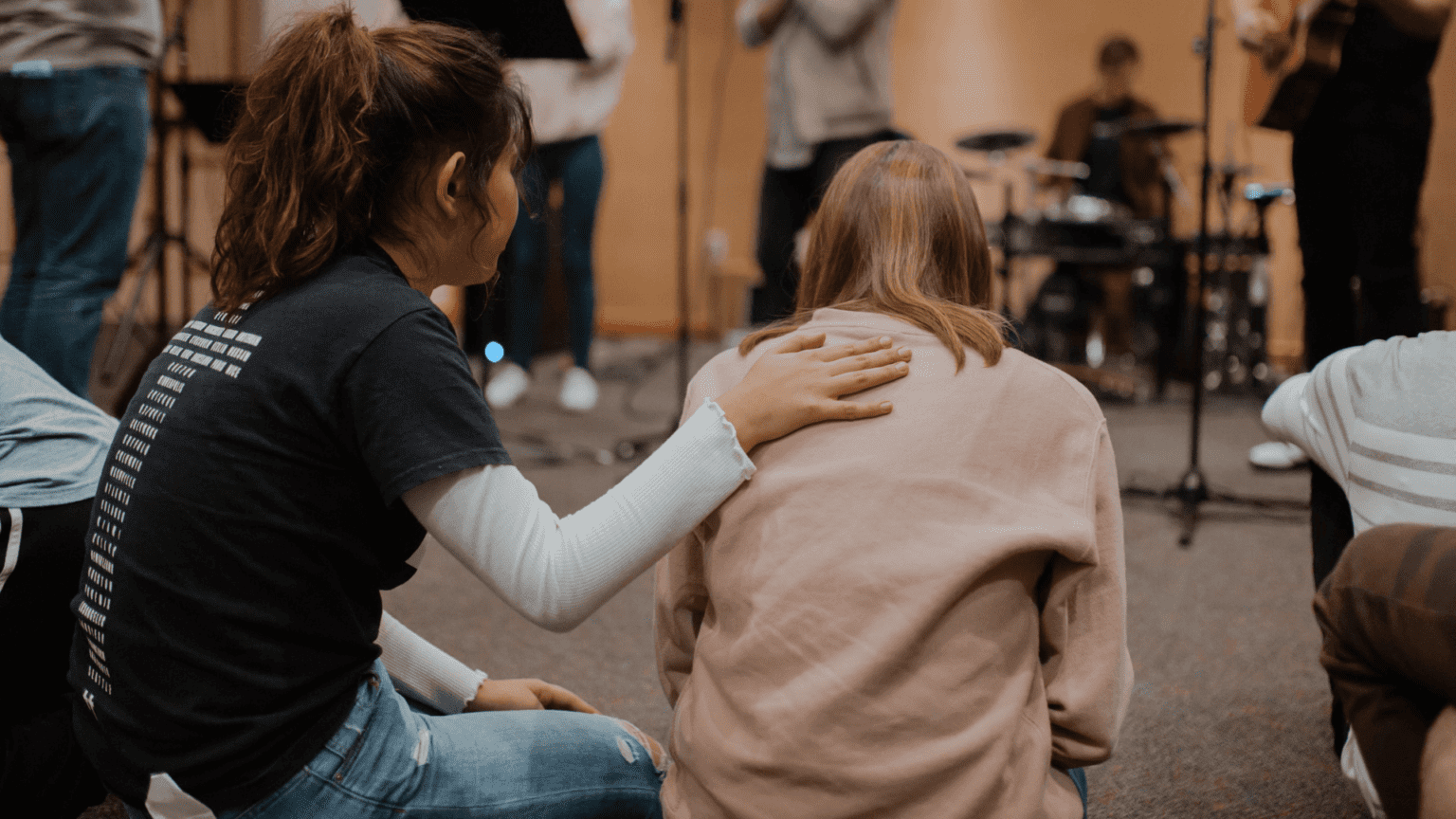Rethinking Volunteer Engagement (Part 3)
If you enjoy this episode, subscribe on your device for more:
Apple Podcasts RSS Stitcher Spotify
Are you keeping people busy, or helping them become more like Jesus?
Healthy churches see volunteering as a key part of their spiritual formation strategy. They create easy on-ramps to help people connect with others, better understand their personal giftings, and fulfill their role in God’s mission. However, many churches still struggle to engage their church in this key area.
In this series on Rethinking Volunteer Engagement, we’re exploring new data insights and giving practical wisdom around building a healthy volunteer culture. In Part 1, Amy and I explained what we found in the data and explore the connections we identified between volunteer engagement, unity, and generosity in the church. In Part 2, we offered some practical strategies for moving more people and leaders from attending services to serving others. (In Part 4, we discussed how staffing decisions and strategies impact volunteer engagement.)
SERVING AS SPIRITUAL FORMATION
In this episode, Amy and I unpack why serving is so important to helping people become more like Jesus and explain how churches can better incorporate serving into their spiritual formation process. Join in as we discuss:
- How healthy churches prioritize serving
- Why engagement is more important than attendance
- Why gifts assessments aren’t necessary to serve
- How complexity kills spiritual formation
"How to Engage More Volunteers & Leaders This Fall"
As we approach Fall 2022, how can we attract and engage more volunteers and leaders to our ministry teams? And once we’ve engaged them, how do we approach onboarding and caring for our volunteer teams?
We invite you and your staff team to join The Unstuck Group for this free one-hour training event.

This Episode is Sponsored by Advent Blocks:
Align your church this Christmas with the Advent Blocks Local Church Program. Advent Blocks is a beautiful Christmas resource that helps kids–and parents–anticipate Jesus all throughout December. And they have something for everyone.
The Local Church Program is sure to have your whole church engaged this Christmas season. Plus, because they did all the work, you can plan it all in just 10 minutes. All you need to do is sign up, order everything at a bulk discount, and have a great Christmas.
If we’re not helping people engage the mission as part of the body of Christ, we’re not helping them become more like Jesus. [episode 258] #unstuckchurch Share on XIt’s not enough for us to teach people. We have to help mobilize them into ministry and join the rest of the Body of Christ in our mission to spread the Good News. [episode 258] #unstuckchurch Share on XMany churches who claim to have a volunteer problem actually have a complexity problem. They have too many competing ministry programs and events requiring more volunteer help. [episode 258] #unstuckchurch Share on X
Leader Conversation Guide
Want to take this conversation back to a staff or senior leadership team meeting?
Our Show Notes subscribers get a PDF download that recaps the episode content and includes a discussion guide you can print out and use at an upcoming meeting.
Opt-in here and get the Leader Conversation Guide for this episode, as well as access to the archive:
Share Your Thoughts and Questions on Social Media
We use #unstuckchurch on Twitter, and we start a real-time conversation each Wednesday morning when the episode drops. You can follow me @tonymorganlive and The Unstuck Group @unstuckgroup. If Facebook is where you spend your time, I’m there, too.
Write a Review—It Helps!
Particularly on iTunes, your ratings and reviews really do help more pastors discover the podcast content I’m creating here. Would you take a minute to share your thoughts? Just open the the podcast on iTunes on your phone or computer, click Ratings & Reviews, and leave your opinion.
Transcript
Sean (00:02):
Welcome to The Unstuck Church Podcast, where each week we are exploring what it means to be an unstuck church. Healthy churches see volunteering not as a means to an end, but as a key part of their spiritual formation strategy. They create easy on-ramps to help people connect with others, better understand their personal giftings and fulfill their role in God’s mission. On this week’s podcast, Tony and Amy continue our series on volunteering with a conversation about how to help people become more like Jesus through serving. Before we get into this week’s podcast, though, I want to invite you to join us on September 1st for a free training for your team on engaging more volunteers and leaders. We’re going to dive deeper on this topic, as well as hear from some churches who are winning with volunteer engagement. You can join Tony and Amy and our Unstuck team for this free training by registering, using the link in your show notes. And if you don’t have the show notes yet, just visit theunstuckgroup.com/podcast to subscribe. Now, before we dive into the content, here’s a word from Tony.
Tony (01:03):
Every year, you plan services for families at Christmas to share Jesus. But despite the fact that parents and churches like to say Christmas is not about the presents, for most American families, it still feels like it is. Advent Blocks believes discipleship rhythms start in the home, but they also work best when a whole church participates together. Advent Blocks created a simple tool churches can provide to unite families around the centrality of gospel uniquely during the Christmas season. Learn how it works today at adventblocks.com/unstuck.
Amy (01:44):
Well, this month we’re focusing each episode on helping you increase volunteer engagement in your church. And today we’re gonna unpack why volunteer engagement is important to helping people become more like Jesus.
Tony (01:55):
But Amy, before we jump into today’s conversation, I just want to brag on a church that’s winning right now, when it comes to volunteer engagement. In fact, they don’t even know that I’m going to do this. So it’ll be fun if they happen to be listening to today’s episode. But if you’re looking for best practices related to volunteer engagement, you should check out Cypress Church near Columbus, Ohio. The website is cypresschurch.tv. They’re pastored by Ken Murphy and under his leadership, Cypress has actually grown to six campuses all throughout central Ohio. And now they have about 3000 people attending their services every weekend. But this is what’s amazing. They have close to 2000 people serving on at least a monthly basis.
Amy (02:42):
Wow.
Tony (02:42):
And of those 2000 volunteers, over 500 people are volunteering in leadership capacities, either in small groups or on different ministry teams. And so I just, when I see a church winning in an area like this, especially volunteer engagement, I just wanted to call that out. And, Amy, if you don’t mind, I’m probably gonna share a little bit of their story throughout today’s conversation.
Amy (03:09):
Yeah. That’s so fun. I think it’s always encouraging for pastors to hear about, you know, examples from other churches where they’re winning and especially in volunteer engagement. And it’s good to see a specific example of what this could look like when churches get it right. And part of getting it right is incorporating serving into the spiritual formation process.
Tony (03:27):
Yeah, that’s right, Amy. And I’ve experienced this in my personal life, because serving, it connects me to other Christ followers. I mean, it certainly helped me more clearly understand the gifting and the strengths that God gave me, which helps me understand my role within the body of Christ. It’s stretched my faith and challenged me to study and apply God’s word in my ministry and pray more, not only for what God’s doing in me, but how he’s using that serving to impact the lives of other people. It’s helped me understand my role in fulfilling God’s mission. I mean, all these things are more, I firmly believe serving should be a key step in the spiritual formation journey of every church. Helping people use their spiritual gifts and their wiring should be a core part of your church’s discipleship path, just like Bible teaching, just like connecting people with other believers in groups or classes. If you’re not helping people engage the mission as part of the body of Christ, I mean, we’re really not helping people become more like Jesus. And if that’s the case, and again, circling back to what Cypress Church is doing. I mean, they provide a great example of what this could look like, how we can incorporate serving as one key step in our discipleship process. So as an example: On their website, if you look at it, there’s a place where you can click on “my next step,” basically, at Cypress Church. And there it’ll take you to a website that is helping people become, they call it being a part of a “difference maker team” at Cypress Church. And when you get to the website, one thing you’ll wanna check out is there’s a quick video from someone, it’s a volunteer on their team, just kind of sharing her story about how volunteering has impacted her life and has allowed her to meet new people at the church and really helping her take her next steps towards Jesus. So check out that video, but when you get to the website, you’ll see they have an easy connection process. It begins with a get started page. And then there are two steps that people can take online and on demand in order to connect with the Difference Maker Team. And then they have one final step that they invite people to be a part of at the church. And the goal for all of this is engagement. It’s not attendance, and many churches promote multiple environments that they want people to attend. I mean, for example, there are Sunday services, midweek services, groups, classes, men’s and women’s gatherings, conferences, events, and on and on and on. And there’s nothing wrong with any of these environments, but they tend to all involve teaching the Bible rather than helping someone engage the mission. And as Christ followers, we need to be doing both. But when we offer many different environments for people to hear biblical teaching, and then we promote those opportunities on a consistent basis, people will always drift towards attendance over engaging the mission. And frankly, sometimes we confuse people even further when we celebrate how many people show up rather than telling the stories of the people who were serving other people. And frankly, I think some of this just gets back to core theology. When Jesus invited the original disciples to follow him, he clearly challenged them to come follow me, and I will show you how to fish for people. I mean, there’s just no doubt that those original disciples were gaining wisdom and knowledge by following Jesus, but they were also preparing to join the mission. In fact, Jesus says, I will show you how to fish for people. So it’s not enough for us to teach people. We have to help mobilize people into ministry and join the rest of the body of Christ in our mission to spread the good news.
Amy (07:26):
So if we’re gonna help people become more like Jesus, serving needs to be a part of our spiritual formation strategy. But that does raise a question that I commonly hear, Tony, from churches, which is how do we help people identify their spiritual gifts?
Tony (07:38):
Yeah. I know many churches use spiritual gifts assessments and personality profiles to help people identify their spiritual gifts. In fact, you’ll see, again, on the Cypress Church website that the second step in their getting started process is an online disc assessment. And then they also offer a spiritual gifts assessment. And they’re trying to encourage people to complete those online assessments before people show up for their in-person final step of the process, which is all about helping people become part of their Difference Maker Team. But here’s a little secret. You don’t need a formal spiritual gifts assessment to help people identify their spiritual gifts. I mean, for many, many years, people learned about their spiritual gifts without taking any formal assessment online. One way we do this obviously is just to help people become more sensitive to the needs of other people in their lives. So when they see a need, encourage people to respond to that need, don’t wait for the church to organize a response. I mean, we just need to respond. And I guess we could look at the original gifts assessment. It was found in 1 Corinthians, and Paul wrote a spiritual gift is given to each of us so that we can help each other. In other words, we should just encourage people to be sensitive to the needs of other people. When God prompts us to help someone need in need, we will naturally respond to that need based on the gifts that God has given us.
Amy (09:15):
You know, Tony, as you’re telling that story, I remember back to my days being on our leadership team, and it’s so true. You have to be careful. If we, as a church, try to organize every serving opportunity, it’s amazing how people become dependent on the church organizing every serving opportunity. So I love the perspective you’re getting, which is just pay attention to the world. Pay attention to where God’s working, and then go join him in that. Yeah. But anyways, back to the spiritual gift assessment.
Tony (09:43):
Yeah. So in this case, rather than taking a test, we just need to be more cognizant of the people around us. I mean, where do others need help? How am I compelled to respond? And I just believe that the holy spirit will prompt a response for those of us who are Christ followers. We just need to act. We don’t have to wait for the church to create a program or a ministry to respond. We can just respond immediately because we are the church. And this approach, I think, what you’ll find is it’s gonna help people discern their gifts. And it will begin to remove the barriers so that people can be mobilized into ministry on a daily basis. I mean, people don’t have to sit around wondering how will the church use my gift? Instead, they can watch for needs in the people that God puts in their lives and jump in immediately to use their gifts to help the church fulfill its mission. And what I’ve noticed is that people tend to respond to needs using their spiritual gifts. So when some people see a need, they pray. Other people, they’ll rally a team to address whatever the need is. Some people will respond by providing wisdom and counsel. Some people will provide a meal. Some people, they just have the amazing ability to fix something that’s broken or that needs repair. I will tell you, Amy, I’m sure that I don’t have that spiritual gift. I think this may be a healthier approach though, than using formal assessments, because the emphasis is more on the person we’re helping and less on us and our spiritual gifts. I mean the other danger of formal assessments is that sometimes people believe that they have a spiritual gift because the assessment said they did, but they really don’t have that gift. And then, I think, they think it’s the church’s responsibility to find a place for them to use that gift even though they really don’t have that gift. And a couple of the areas that I’ve specifically seen this play out: one is in the area of leadership. And then the other is in the area of teaching.
Amy (11:52):
You should have had me guess first, Tony. I bet I would’ve guessed those.
Tony (11:56):
Oh yeah. You would’ve guessed that. Let me explain it to this, to you this way. If you have the leadership gift, your church will not need to provide people for you to lead. God will use that gift to accomplish his purposes. And people will begin to follow you if you have that gift. And likewise, if you have a teaching gift, your church won’t need to provide you a teaching platform. God will bring people to learn from your wisdom and experience and give you a teaching platform. And again, I think the better way for us to learn our gifts and strengths is just to recognize when we see a need in someone else’s life, we need to respond to that need. Have you ever taken one of those assessments?
Amy (12:39):
Oh gosh. Ages ago I took one, but I don’t even. I did it the way that you said, Tony, actually. When my husband and I got connected at our church, we just looked for the needs and we ended up starting and we served in kids’ ministry to start. And we did that for several months, and then it led us to our next serving opportunity. And our next one, until we finally landed where we really felt like we were using our spiritual gifts. But you have to kind of work it out. My husband often talked about it at our church about getting into the shallow end of the pool and just start wading in. Find your spot. You don’t have to wait for the spot, you know, the place that you are to be serving. Just jump in. That’s what we always encouraged our people. Start somewhere, you don’t have to stay forever, until you discover where God’s really gifted you to serve. So I just remembered. They’re leadership and administration, but I am a leader. I’m just kidding.
Tony (13:29):
And now you want me to help you find a leadership role?
Amy (13:32):
Yes, please.
Tony (13:34):
I’ll see what I can do about that, Amy.
Amy (13:36):
You know, Tony, earlier you mentioned all those environments that can compete with volunteer engagement. It seems like pruning might also be a part of how we can help people become more like Jesus.
Tony (13:46):
Yeah, yeah. Yeah, no doubt about it, Amy. I think, there’s something to that. And I agree that sometimes churches seem to be more concerned with keeping people busy, honestly, rather than helping people become more like Jesus. And I’m convinced that helping people use their gifts and strengths to serve other people both inside and outside the walls of the church, that’s just essential to helping people become more like Jesus. I mean, honestly, sometimes all those various teaching environments and gatherings, they also impact the church’s ability to find enough volunteers for what should be their primary ministry environment. So just as one example, I’ve seen this time and time again, it is not unusual for churches to have many volunteers teaching and attending Sunday school classes, but then they don’t have enough adult volunteers to help kids and students take their next steps towards Jesus. And I may be picking on Sunday school here, but it could be any number of other great ministries or programs or events that may be competing with kids and student ministries for volunteers. Several years ago, someone, a church leader, came up to me and they were just convinced we have a volunteer problem. And so I said, well, help me with a little bit of information here so that I can confirm that and then guide you with some next steps. So I just asked the question, how many adults and students are there in your church and how many are serving? And when they started to do the math in their head, they realized 60% of their adults and students were serving in some volunteer capacity on a regular basis. And yet, they’s felt like they had a volunteer problem. And the reason why they were feeling that is they weren’t able to fill all of the volunteer needs that they had in all these key ministries, because they were trying to do too many things. And so I just helped them see, you don’t really have a volunteer problem. You have a complexity problem. So let me get specific here. If you have a high percentage of people serving at your church, and I would say more than half of your students or adults, if they’re serving someplace on a regular basis and you’re still having challenges filling volunteer roles for key ministry areas, then you may want to evaluate whether or not you’re trying to do too many things. You may be offering too many services, too many programs, too many events. And you’re asking people to attend in too many ways. And because of that, that could be the reason why you’re facing volunteer challenges. So we’ve worked with many churches who claim to have a volunteer problem. When in reality, they have a complexity problem. They have too many competing ministry programs and events, and all of those ministries and programs are searching for volunteer help. And so this could be your challenge. If you feel like we just don’t have enough volunteers to help in kids, to helping students or any of these other really key ministries of your church. If that’s the case, it could be that you just have people that are unwilling to serve, and we could address that problem one way. But the other reason why you may be facing this problem is just because you’re trying to do too many things. And that’s not just a calendar or scheduling problem, that actually becomes a spiritual formation problem. Because again, keeping people busy doesn’t help them become more like Jesus.
Amy (17:22):
That’s really good. Tony, do you have any final thoughts before we wrap up today’s conversation?
Tony (17:26):
Well, I know every staff person probably shares this responsibility for equipping God’s people to do the work of God. So again, I wanna invite you and your staff team to join us on September 1st. We’re offering a free one-hour training event where we’ll be equipping your team to attract and retain more high-level volunteers and volunteer leaders for ministry this coming fall. So check out the show notes of this episode so that you can register for that free webinar.
Sean (17:56):
Well, thanks for joining us on this week’s podcast. At The Unstuck Group, our goal is to help pastors grow healthy churches by guiding them to align vision, strategy, team and action. In everything we do, our priority is to help churches help people meet and follow Jesus. If there’s any way that we can serve you in your church, reach out to us today at theunstuckgroup.com. Next week, we’re back with another brand new episode. Until then, have a great week.





![[ucr q2 2025] linkedin ads (1)](https://theunstuckgroup.com/wp-content/uploads/2025/05/UCR-Q2-2025-LinkedIn-Ads-1-1024x535.png)


Leave a Reply